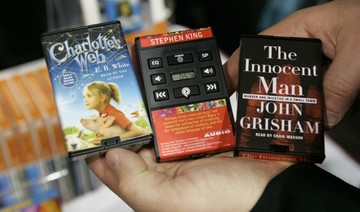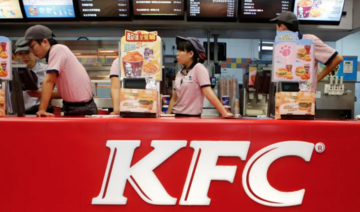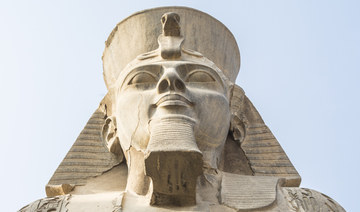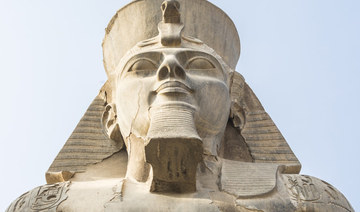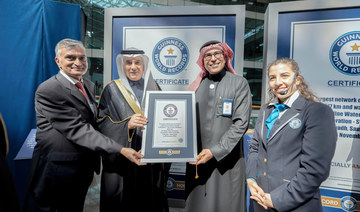NEW YORK: The humble cassette — that tiny little plastic rectangle containing the homemade mixtapes of yesteryear — is back, joining vinyl as a darling of audiophiles who miss side A and side B.
But as top musicians including Ariana Grande and Justin Bieber release their music on tape and demand continues to climb, the niche revival has faced a global shortage of music-quality magnetic tape needed for production.
Now, two facilities — one in the American Midwest and the other in western France — have stepped in to meet the need.
“It’s a good place to be — there’s plenty of business for both of us,” said Steve Stepp, who founded the National Audio Company in Springfield, Missouri with his father 50 years ago.
He said that around 2000 the “imperial hegemony of the CD” cut his business, which stayed alive as a major manufacturer of books on tape that remained popular.
But despite the astronomical rise of streaming, Stepp said rock bands like Pearl Jam and The Smashing Pumpkins began seeking to manufacture anniversary tapes in the mid-2000s, launching a cassette comeback tour.
“That convinced major record labels that there was still life in the cassette as a music form,” he said.
Several years ago, National Audio bought 300,000 reels of tape from a South Korean company that gave up music-grade tape production.
As that stockpile began to shrink, his facility in November 2016 was faced with a choice: either make reels, or fold.
His business invested several million dollars buying up old equipment from defunct production facilities, and last year National Audio manufactured 18 million audio cassettes, Stepp said, selling to 3,500 record labels globally.
“I think it’s got a bright future,” Stepp said of the cassette market. “It died in 2000, as far as conventional wisdom was concerned, and it has made a strong comeback since.”
“Reports of its death were greatly exaggerated.”
Since November, Mulann — a small French company near Mont Saint Michel — has also rebooted production, the country’s first manufacturing of music-grade tape in two decades.
Already selling magnetic tape for metro tickets or military recording studios, the Mulann group acquired a plant to produce analog audio tapes under the trademark Recording The Masters.
For Jean-Luc Renou, Mulann’s CEO, there’s still a place for analog sound in today’s ephemeral music world.
“Take the example of heating: you have radiators at home. It’s comfortable, it’s digital — but next to you, you can make a good fire.”
“Pleasure” is the goal, he said: “That’s the cassette or vinyl.”
The company sells tapes for €3.49 each, producing them by the thousands each month and exporting 95 percent worldwide, according to commercial director Theo Gardin.
The 27-year-old admits he didn’t know in his youth the joys — and pains — of the Walkman personal tape player, or the delicate strip of tape that tangles up and must be rewound with, say, a pen. Or a finger.
According to Stepp, it’s precisely 20-somethings like Gardin fast-forwarding demand, as young people seek something tangible in the Internet age.
Urban Outfitters — an American clothing brand catering to hipster types that also sells electronics — on its site spells out the mixtape process.
“If you’ve never spent 3-5 hours sitting by the radio, waiting for that one Hanson song to come on so you could add it to your mixtape, get pumped: you can now relive that experience,” it says.
“Let those ‘90s vibes wash over you, man.”
Cassette tape album sales in the US grew by 23 percent in 2018, according to tracker Nielsen Music, jumping from 178,000 copies the year prior to 219,000.
It’s nothing compared to 1994 sales of 246 million cassette albums, but significant considering the format was all but dead by the mid-2000s.
“As an old fogey I don’t want to imagine a world with no analog,” Stepp said. “The world around is analog; our ears are analog.”
“Digital recordings are very clean and sharp but there are no harmonics. These are digital pictures of audio recordings, if you will.”
Bobby May, a 29-year-old buyer at Burger Records in southern California, said that while “physical media in itself is a totally antiquated idea,” cassette sound has what he called a uniqueness.
“The consumer public is fickle and trends always change, but for the foreseeable future, I know tons of people will stay pretty crazy for records and vinyl.”
Last year vinyl saw revenues hit their highest level since 1988, totaling $419 million — an eight percent jump from the previous year.
Though vinyl’s sound quality is unquestionably superior to cassettes, May said tapes’ low cost makes them ideal for collectors.
“I still like stuff pilin’ up around me,” May laughed, adding that he probably has 500 tapes from Burger.
In addition to the homemade and indie cassettes, he cherishes several mainstream albums as well.
“I have a prized ‘Baby One More Time’ cassette,” he said, referring to pop princess Britney Spears’ debut album. “It looks great on my shelf.”
Back to the future: cassettes launch comeback tour
Back to the future: cassettes launch comeback tour
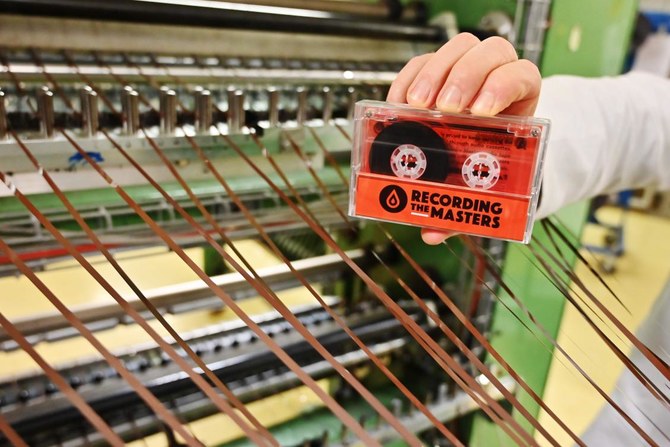
- The niche revival has faced a global shortage of music-quality magnetic tape needed for production
- ‘It died in 2000, as far as conventional wisdom was concerned, and it has made a strong comeback since’
Algeria’s first KFC restaurant reopens without logo following Gaza protests
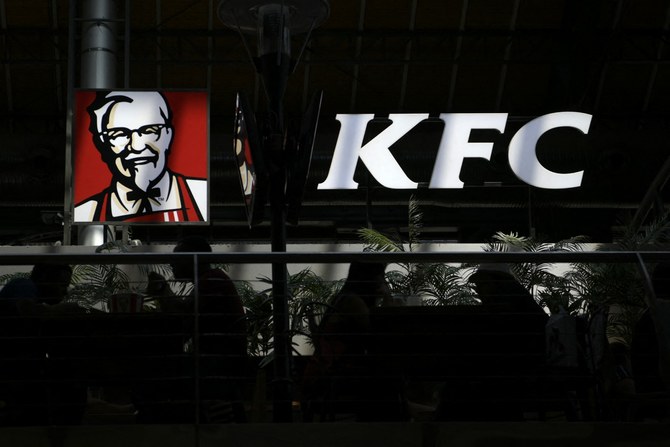
- Protesters gathered outside outlet last week in solidarity with Palestinians
- KFC parent company Yum! Brands has faced backlash for its ties with Israel
LONDON: Algeria’s first Kentucky Fried Chicken outlet has resumed operations after a temporary closure prompted by a series of pro-Palestinian demonstrations last week.
However, the restaurant, situated in the Algiers suburb of Dely Ibrahim, reopened its doors without the familiar Col. Sanders logo on its exterior.
It remains unclear if the outlet has had a change of ownership or remains under the umbrella of Yum! Brands, the parent company of KFC.
Demonstrators gathered outside the eatery on April 16, calling for a boycott and expressing solidarity with Palestinians amid the Gaza conflict.
Protesters draped in Palestinian flags voiced support for “Palestinian martyrs” while obstructing access to the storefront.
The restaurant has faced a backlash due to its perceived ties to Israel, with Yum! Brands having made investments in Israeli startups, including TicTuk, a company that allows customers to order food on social networks and message apps, and Dragontail, a system software company specializing in food processing.
In response, the Boycott, Divestment, Sanctions movement designated KFC’s sister company, Pizza Hut, as an “organic boycott target,” due to the “brands’ complicity in Israel’s genocide and apartheid against Palestinians.”
بعد أيام من افتتاح فرعها الأول، KFC الجزائر تزيل شعار علامتها وتُغلق أبوابها!
— أحمد داود (@AhmadDaoud14) April 17, 2024
منذ افتتاحها تعالت أصوات مقاطعتها، ووقفات احتجاجية أمامها، واستنكارٌ لمنح الترخيص لوكيلها! #الجزائر
pic.twitter.com/rIaOG80xTi
While the temporary closure of the KFC outlet was hailed as a success by demonstrators, its reopening sparked disappointment among some Algerians.
The incident underscores challenges and employment ramifications stemming from boycotts related to the Gaza conflict.
Since the start of the war, regional franchises of McDonald’s, one of the key boycotted brands, have distanced themselves from the parent company, arguing that they are 100 percent local.
The opening of a KFC branch in Algeria was noteworthy given the nation’s historical aversion to Western food chains, as well as its stringent foreign investment regulations, which typically prohibit the establishment of foreign food or beverage franchises.
Previous efforts to establish outlets without official approval, such as the brief appearance of a counterfeit “Starbucks,” have been met with swift action and closure.
Doner diplomacy: German president’s kebab trip to Turkiye sparks controversy
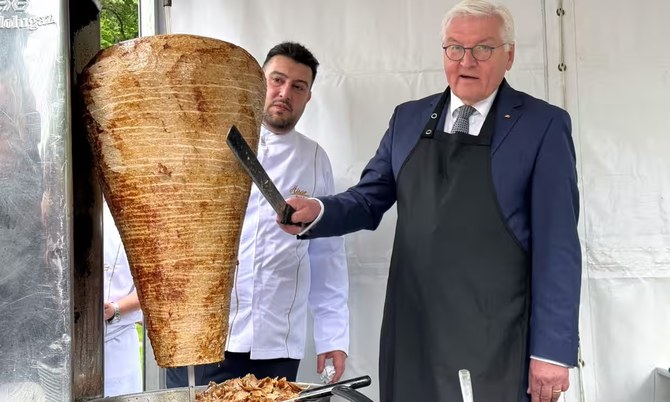
- German-Turkish say 60-kg kebab skewer brought from Germany in diplomatic mission reduces community’s contributions to stereotypical image
LONDON: German President Frank-Walter Steinmeier’s visit to Turkiye this week has stirred controversy after he brought along a 60-kg kebab skewer as part of his diplomatic mission.
Starting his three-day tour in Istanbul instead of Ankara, Steinmeier served kebabs at a reception, viewing it as a symbol of cultural exchange between the two nations.
“It is these special and intense relationships that bridge distances, and also some differences, today,” he said.
However, rather than emphasizing the close personal ties between Germans and Turks, the gesture drew criticism from many in the diaspora who viewed it as reducing their community’s contributions to a stereotypical image.
Germany, home to 2.7 million people of Turkish descent, welcomed hundreds of thousands of workers in the 1960s as part of its “guest worker” program, a bilateral agreement with Ankara to address labor shortages.
Turkish-Germans took to social media to condemn what they saw as a clumsy attempt to represent their community, accusing Steinmeier of failing to take them seriously or treat them as equals.
“Turkish-Germans discovered the 1st COVID vaccine in the world; some were movie directors who won awards on behalf of Germany, numerous writers, musicians, intellectuals from Turkey call Germany home,” wrote Evren Celik Wiltse, a professor of political science, on X.
“Of all of these, the (German) president chose the kebab maker to accompany him to (Turkiye)”, she added.
Turkish-Germans discovered the 1st COVID vaccine in the world; some were movie directors who won awards on behalf of Germany, numerous writers, musicians, intellectuals from Turkey call Germany home.
— Evren Celik Wiltse (@EvrenWiltse) April 22, 2024
Of all these, the president chose the kebab maker to accompany him to https://t.co/ZVMHyi48P0
Berkay Mandıracı, a senior analyst of Turkish-German heritage at the non-governmental organization Crisis Group, acknowledged that the gesture was well-intentioned but felt it was “anachronistic and reductionist.”
A well-intended gesture, I'm sure, but somehow not belonging to this age. As someone born and raised (until I was 12) in Germany, this feels anachronistic and reductionist.
— Berkay Mandıracı (@BerkayMANDIRACI) April 23, 2024
But let's not read too much into it and hope the rest of the visit will deepen Turkish-German ties https://t.co/ZjUvCLH7ES
The faux pas, which risked overshadowing the celebration of 100 years of diplomatic ties between the two nations, received the approval of Arif Keles, a third-generation kebab shop owner invited on the delegation trip by Steinmeier.
Keles, who served kebabs during the reception, described the opportunity as a “great honor.”
The dish of thinly sliced meat cooked on a vertical rotisserie was introduced to Germany by Turkish migrants.
Packed with chopped vegetables and doused with mayonnaise, the doner kebab has gained iconic status.
Local sales of the kebab total an estimated €7 billion ($7.5 billion), an immigrant success story the German presidency wanted to celebrate as an example of “how much Turkiye and Germany have grown together.”
Relations between Berlin and Ankara have been strained by various disputes, including disagreements over the Gaza conflict.
Steinmeier, visiting Turkiye for the first time since assuming office in 2017, has had a challenging relationship with Turkish President Recep Tayyip Erdogan, criticizing him for his approach to concerns about democratic norms in Turkiye.
Turkish-Germans have long spoken up about economic and social exclusion. Last year, Germany agreed to significantly ease citizenship rules to allow more dual nationals, a move welcomed by many Turkish individuals who have lived in Germany for decades.
With AFP
Controversy erupts as British MP Lee Anderson misses St. George’s Middle Eastern heritage
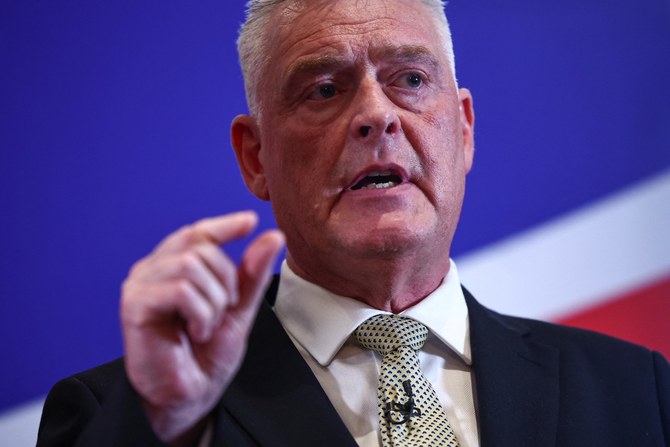
- The politician fails to acknowledge the patron saint of England’s connection to the Middle East in a video posted to celebrate St. George’s Day
LONDON: Reform UK MP Lee Anderson faced mockery after failing to acknowledge St. George’s historical ties to the Middle East in a recent social media post.
The former politician, who joined the far-right party after being suspended by the Conservatives for racist remarks about Mayor of London Sadiq Khan, shared a video on Tuesday commemorating St. George’s Day.
In it, Anderson proudly displayed red and white cufflinks matching the English flag. Also known as the St. George’s Cross, the symbol is historically associated with the Christian crusades.
“It’s St. George’s Day today and this country of ours has been a gift to the world,” Anderson said in the video.
In the accompanying caption, he wrote: “Trigger Warning. If you are a Guardian reading, advacado eating, Palestinian flag waving, Eddie Izzard supporting Vegan then this clip is probably not for your consumption.”
Anderson’s comments sparked amusement among users on X, where critics seized on his misspelling of “avocado” and highlighted the connection between Palestine and St. George, who is revered not only in England but also in parts of Africa, the Middle East, the Caucasus, and South America.
Comedian Shaparak Khorsandi quipped: “Who is going to tell him about St George’s connection to Palestine? (His mother was Palestinian, they too have a St. George’s day/feast. Though, to be fair, it is not known if he was related to Eddie Izzard),” referring to the actor/comedian.
Another user responded by sharing an image detailing facts about St. George, suggesting that if he were alive today, he would be considered an “immigrant” by Anderson’s standards, a group the Reform UK MP has repeatedly advocated should be deported.
Happy St George’s day. pic.twitter.com/Zq9cKGksOK
— GonePrivateIsh - still the same drivel (@Lairdysnr) April 23, 2024
Observed annually on the anniversary of St. George’s death with parades and marches, St. George’s Day was previously a national holiday and was once celebrated in England as widely as Christmas.
Born around AD 280 in what is now known as Cappadocia, Turkiye, St. George served as a soldier in the Roman army and fought in the crusade against Muslims. Beheaded in modern-day Palestine for refusing to renounce his Christian faith, St. George is revered by Christians, Druze and some Muslims as a martyr of monotheistic faith.
Renowned for his strength, courage and loyalty, St. George became a cherished figure in Europe and has been a symbol of English culture since the 14th century, despite never setting foot in the country.
Egypt reclaims 3,400-year-old stolen statue of King Ramses II

- Egyptian authorities spotted the artefact when it was offered for sale in an exhibition in London in 2013
CAIRO: Egypt welcomed home a 3,400-year-old statue depicting the head of King Ramses II after it was stolen and smuggled out of the country more than three decades ago, the country’s antiquities ministry said on Sunday.
The statue is now in the Egyptian Museum in Cairo but not on display. The artefact will be restored, the ministry said in a statement.
The statue was stolen from the Ramses II temple in the ancient city of Abydos in Southern Egypt more than three decades ago. The exact date is not known, but Shaaban Abdel Gawad, who heads Egypt’s antiquities repatriation department, said the piece is estimated to have been stolen in the late 1980s or early 1990s.
Egyptian authorities spotted the artefact when it was offered for sale in an exhibition in London in 2013. It moved to several other countries before reaching Switzerland, according to the antiquities ministry.
“This head is part of a group of statues depicting King Ramses II seated alongside a number of Egyptian deities,” Abdel Gawad said.
Ramses II is one of ancient Egypt’s most powerful pharaohs. Also known as Ramses the Great, he was the third pharaoh of the Nineteenth Dynasty of Egypt and ruled from 1279 to 1213 B.C.
Egypt collaborated with Swiss authorities to establish its rightful ownership. Switzerland handed over the statue to the Egyptian embassy in Bern last year, but it was only recently that Egypt brought the artefact home.
A Nigerian chess champion is trying to break the world record for the longest chess marathon
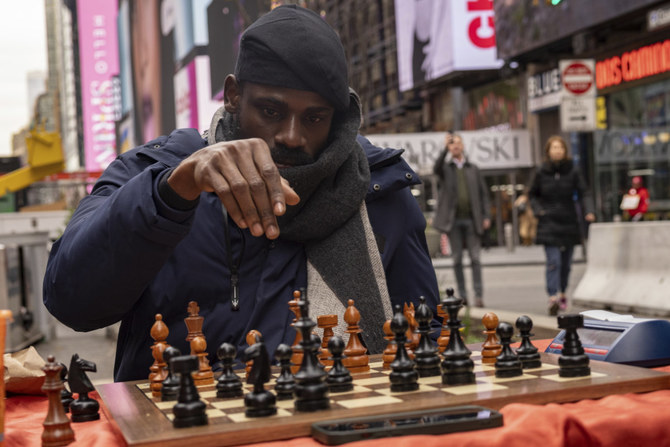
- Tunde Onakoya, 29, is playing against Shawn Martinez, an American chess champion, in line with Guinness World Record
- Onakoya, who founded Chess in Slums Africa, hopes to raise $1 million for children’s education across Africa
NEW YORK: A Nigerian chess champion and child education advocate is attempting to play chess nonstop for 58 hours in New York City’s Times Square to break the global record for the longest chess marathon.
Tunde Onakoya, 29, hopes to raise $1 million for children’s education across Africa. He is playing against Shawn Martinez, an American chess champion, in line with Guinness World Record guidelines that any attempt to break the record must be made by two players who would play continuously for the entire duration.
Onakoya had played chess for 42 hours by 10:00 a.m. GMT on Friday. Support is growing online and at the scene, where a blend of African music is keeping onlookers and supporters entertained amid cheers and applause.
The current chess marathon record is 56 hours, 9 minutes and 37 seconds, achieved in 2018 by Hallvard Haug Flatebø and Sjur Ferkingstad, both from Norway.
The record attempt is “for the dreams of millions of children across Africa without access to education,” said Onakoya, who founded Chess in Slums Africa in 2018. The organization wants to support education of at least 1 million children in slums across the continent.
“My energy is at 100 percent right now because my people are here supporting me with music,” Onakoya said Thursday evening after the players crossed the 24-hour mark.
On Onakoya’s menu: Lots of water and jollof rice, one of West Africa’s best known dishes.
For every hour of game played, Onakoya and his opponent get only five minutes’ break. The breaks are sometimes grouped together, and Onakoya uses them to catch up with Nigerians and New Yorkers cheering him on. He even joins in with their dancing sometimes.
A total of $22,000 was raised within the first 20 hours of the attempt, said Taiwo Adeyemi, Onakoya’s manager.
“The support has been overwhelming from Nigerians in the US, global leaders, celebrities and hundreds of passersby,” he said.
Onakoya’s attempt is closely followed in Nigeria where he regularly organizes chess competitions for young people living on the streets to boost his cause. More than 10 million children are out of school in the West African country — one of the world’s highest rates.
Among those who have publicly supported him are celebrities and public office holders, including Nigeria’s former Vice President Yemi Osinbajo, who wrote to Onakoya on X, formerly Twitter: “Remember your own powerful words: ‘It is possible to do great things from a small place.’“
The Guinness World Record organization has yet to publicly comment about Onakoya’s attempt, which could reach 58 hours by midnight on Friday. It sometimes takes weeks for the organization to confirm any new record.




